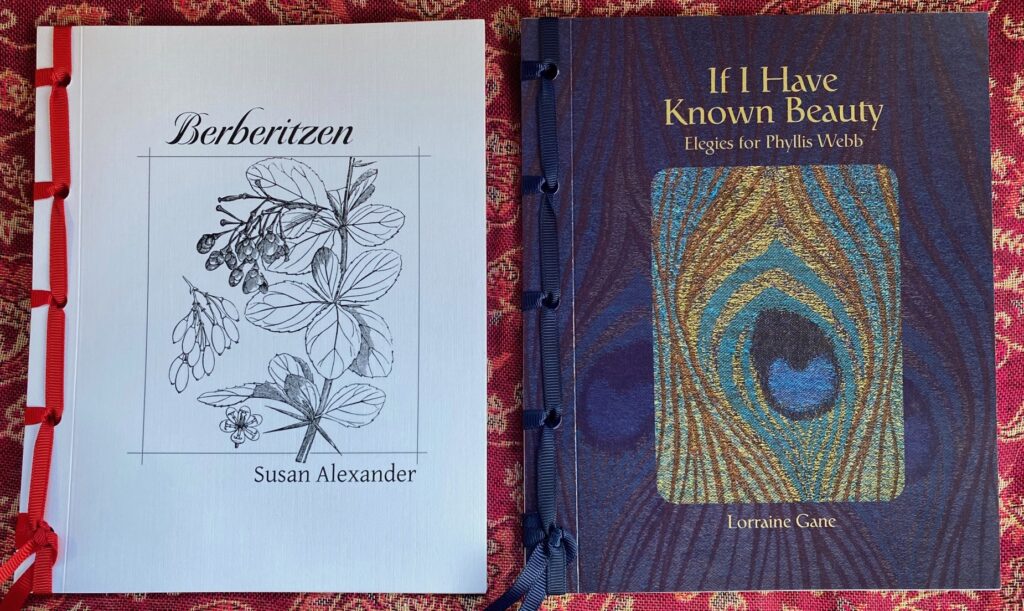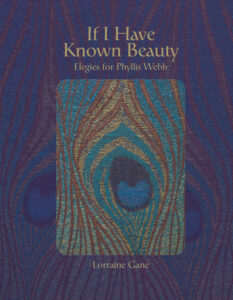Poems ‘about life, death, and between’
Berberitzen
by Susan Alexander
Salt Spring Island: Raven Chapbooks, 2024
$20.00 / 9781778160363
If I Have Known Beauty: Elegies for Phyllis Webb
by Lorraine Gane
Salt Spring Island: Raven Chapbooks, 2024
$20.00 / 9781778160370
Reviewed by Mary Ann Moore
*

By appearance alone, Susan Alexander’s Berberitzen and Lorraine Gane’s If I Have Known Beauty: Elegies for Phyllis Webb are noteworthy. With their professional design, quality paper, and hand-stitched ribbon binding, they’re exquisite works of art. The poems inside both chapbooks are equally exquisite for their relatable realities and discoveries about life, death, and between.
Alexander’s poems pay homage to her beloved husband, Ross McDonald, who died earlier this year. (Berberitzen was on the shortlist of the 2024 Raven Chapbooks contest that I blind-judged with Ursula Vaira. Once the list of finalist names was revealed, the publisher chose to produce Berberitzen along with the winning manuscript, Andrea Scott’s In the Warm Shallows of What Remains.)
Gane’s If I Have Known Beauty pays tribute to her late friend and mentor Phyllis Webb. While Alexander explores different forms (pantoum, anaphora, ballad, haiku), Gane creates elegies in the form of ghazals, an ancient Persian form at which Webb excelled.
Nexwlélexm/Bowen Island resident Susan Alexander (The Dance Floor Tilts) titled her collection—Berberitzen (barberries)—after a poem by Rainer Maria Rilke. It has haunted her since the first time she read it.
“A Book for the Hours of Prayer (Das Stundenbuch),” as translated by Robert Bly, the version Alexander has been drawn to, “carries a warning to pay attention and to find the authentic self while there is time.” Her late husband, Alexander explains, “was that rare man who was very much himself.”
“Berbertizen” is excerpted on the back cover:
The end of September. Light pours red silk
over plates and pages, translations of Rilke,
the old asters hardly breathe in their beds.
And you are the stone that draws in the night.
and I am the barberry, waiting, and ripe.
As well as the erotic and the wonderful sounds of silk and Rilke, there is the very real anticipation of the end. In the final couplet of “Vanishing Gods,” the collection’s second poem, the speaker states: “You were leaving this world when I found you. / You were always leaving.”

The very title “Dust” conjures up a domestic scene and our collective fate as well as the anticipated demise of the subject of these poems. While faraway places may be noted (for instance, a sinking street in “Venice Proposal”) it’s at home, as in the case of “Dust,” that Alexander weaves her themes so well.
“He wants to talk facts” while the poem’s speaker beckons the man to the window: “to see the big leaf maples at the beach, / solid gold before the day shuts down.”
There is much told about the intricacies of an intimate relationship and “what is unspoken gathering like dust.” The speaker considers the man’s driving away “practise rounds”—“We live with this dust. I lack belief / in dogs and downsizing. I long to carry / his light under my skin.”
The beauty of the ordinary is laced with the practical and onerous details of a medical diagnosis in “Waffles and Strawberries.” It’s a rich poem with memories of a Norwegian grandmother and how waffles were served by Mum in the speaker’s past.
In the present, the speaker offers the man in the poem “waffles with everything” and reminisces of blushing “when he touches me with those powerful hands.”
The poem ends:
It’s winter now so even though
every trucked-in berry promises sweet
under ruby skin, each slice
pales to white.
Alexander’s poems describe the desire to be present and appreciative, while knowing the leaves will fall, a husband will die. She fills her poems with love and confides that her husband’s “companionship remains a deep vein that I hope I will mine the rest of my days.”

The title of the sequence and the chapbook of SĆUÁN (čuʔén)/Salt Spring Island resident Gane’s If I Have Known Beauty originates in Webb’s poem “Some Final Questions,” first published in 1965’s Naked Poems.

The book’s cover details refer to a blue peacock shawl worn by Webb during the launch of her final book, Peacock Blue, and given to Gane. Inside is “12 x 16 Series Green, 2002,” a full-colour reproduction of Webb’s acrylic on canvas. Webb played “a vital role” in Gane’s poetic and personal life; following her friend and mentor’s death, Gane (The Way the Light Enters) wrote ghazals in honour of her.
Webb sometimes wrote “anti ghazals,” as she called them when they broke the rules of the traditional form. Gane also veers from the traditional form on occasion. For instance, enjambment isn’t usually an aspect of the traditional ghazal. Each couplet is independent, so that the order can be changed according to a poet’s preference (or a reader’s, in fact).

Gane’s poems are impeccable in their crafting and are woven with memories of and advice from Gane’s beloved mentor of over twenty years.
Readers are gently invited into a deep, liminal, and mysterious realm—which is where Gane found herself following her friend’s death. The poems, Gane explains, seemed to be held in what Tibetan Buddhists call the bardos, a state of forty-nine days following death to rebirth.
The bardos is noted in “Elegy 3” as a place where Webb, the “you” of the poem, dwells for forty-nine days, “destination unknown.”
“Elegy 3” is the first of three, including 13 and 23, that refer to a line—“From the land of only what is” —in Webb’s “Leaning,” which appeared in Water and Light: Ghazals and Anti Ghazals. While in a liminal realm, the speaker remembers the poetry of her mentor and listens to: “Your voice on phone messages I can’t erase.” The ghazal, made of five couplets, concludes with: “Incessant rain, the night sheds its dark tears; / I read your Vision Tree poems.”
Gane’s poems ask questions as she continues to receive good counsel through her mentor’s lines of poetry. The speaker of these elegies makes note of the earth’s changes and finds solace in the natural world. From “Elegy 6”: “In the forest earth soaks up the deluge, / white buttons poke through the moss.” And, from “Elegy 8”: “Light on water this morning, the creek aglow with alders.”
In “Elegy 8,” the speaker addresses the subject of her poems: “You’re weightless now, earthly burdens left in boxes / of books, paintings waiting in the wings.” Twelve days before Winter Solstice, the turning of the year, the speaker observes: “Half in this world and half in the other, / I wait in the spaces in between.” The poems share the speaker’s days and the state of the world, notably, in “Elegy 19,” with “the cold, panic / mounting in the fourth Covid wave.”
“And the great dreams pass on / to the common good” Webb wrote in “The Days of the Unicorns.” They’re the final words of “Elegy 24,” as the speaker warms herself with “your blue-and-purple wool scarf / scented with perfume.”
I can’t help but think that finding form for the early days of grief acts as a container in which words and images help one to bear witness while recalling Webb’s phrase of acceptance: “the land of only what is.”
[Editor’s note: Susan Alexander and Lorraine Gane will launch their chapbooks 7pm, Saturday November 30, Salt Spring Island Public Library.]
*

Mary Ann Moore is a poet, writer, and writing mentor who lives on the unceded lands of the Snuneymuxw First Nation in Nanaimo. Her full-length book of poetry is Fishing for Mermaids (Leaf Press, 2014) and she has a new chapbook of poems called Mending (house of appleton). Moore leads writing circles and has two writing resources: Writing to Map Your Spiritual Journey (International Association for Journal Writing) and Writing Home: A Whole Life Practice (Flying Mermaids Studio). She writes a blog here. [Editor’s note: Mary Ann Moore has also reviewed books by Judy LeBlanc, Kayla Czaga, Christine Lowther, Jude Neale and Nicholas Jennings, Yvonne Blomer and DC Reid, Marita Dachsel and Nancy Lee (eds.) Lisa Ahier, with Susan Musgrave, Stephen Collis (ed.) for BCR.]
*
The British Columbia Review
Interim Editors, 2023-25: Trevor Marc Hughes (non-fiction), Brett Josef Grubisic (fiction and poetry)
Publisher: Richard Mackie
Formerly The Ormsby Review, The British Columbia Review is an online book review and journal service for BC writers and readers. The Advisory Board now consists of Jean Barman, Wade Davis, Robin Fisher, Barry Gough, Hugh Johnston, Kathy Mezei, Patricia Roy, Maria Tippett, and Graeme Wynn. Provincial Government Patron (since September 2018): Creative BC. Honorary Patron: Yosef Wosk. Scholarly Patron: SFU Graduate Liberal Studies. The British Columbia Review was founded in 2016 by Richard Mackie and Alan Twigg.
“Only connect.” – E.M. Forster
One comment on “Poems ‘about life, death, and between’”